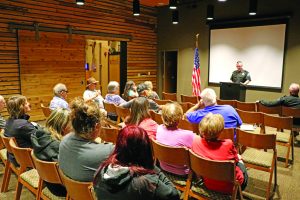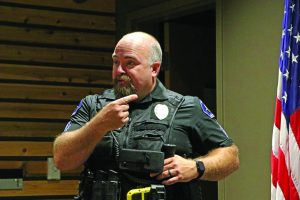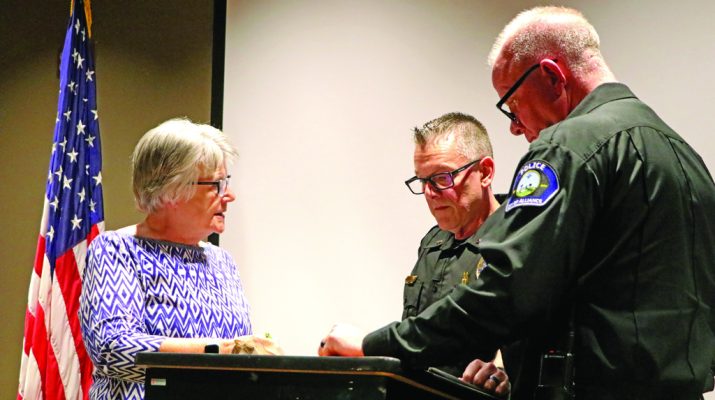A recent public forum hosted by the Alliance Police Department allowed officers a chance to provide intel about several community issues raised by concerned citizens, and to give an overview of the direction that the department is heading.
APD Chief David Leavitt opened the forum by giving insights into the department and changes that have been implemented in the six months he has served as chief. He said one of the first accomplishments was updating the policy manual to better reflect the goals of the department.
“When I got here, the department policy manual was very outdated,” said Leavitt. “There were many policies that were not consistent with the things we are doing, with our practices.”
Other changes to the department include updates to the budget and working to reduce expenditures, updating equipment, including ballistic vests for the officers, and altering the agreements for towing so that the department would not have to pay for towed vehicles any longer.
“Up until recently, the city was being charged for all tows regardless of what the customer, or person picking it up at the wrecker lot might have been charged,” Leavitt said. “I have changed that. We will not be billed for towing unless it goes to our impound lot. For any parking or abandoned vehicles, or non-criminal situations, it will go to the wrecker service’s lot and they will be responsible for recouping that cost; it will not be on the backs of the taxpayers.”
One program that was ended was the decoy car program, which involved parking patrol vehicles at various locations in the city as a way to deter crime.
“I know there’s a small number of people who think that was a worthwhile endeavor,” said Leavitt. “I want to assure you that although criminals are sometimes stupid, they’re not that stupid. We were spending a lot of time and a lot of resources, and really wearing out our volunteers moving these cars around, and spending money repairing these cars that weren’t even road worthy. They’re the ones that just got auctioned and put $22,000 back in the general fund.”
One issue the department is cracking down on, Leavitt explained, is speeding, noting that since the school year began, they have increased their traffic enforcement efforts, especially in school zones.
“Just since school has started, because, if you don’t see it, you don’t think it’s happening, so I think it’s really important that I share this with you,” Leavitt said. “Since school has started, we have made 137 traffic stops. Just in school zones alone, we’ve issued 24 citations and almost 30 warnings. We are aware of it, we are working on it. The officers are out there trying to get people to slow down in those school zones.”

Leavitt explained that those who have been stopped and warned on several occasions are likely to receive citations. Patricia Jones shared a concern regarding pedestrian safety in the area around Alliance Middle School, offering Leavitt and Lieutenant Kirk Felker a diagram highlighting the major areas of concern. She asked about having more crosswalks and signage in the area, and Leavitt said he would share the information with the Streets Department. She mentioned the possibility of having speed bumps as well, and Sergeant Tim Peterson explained that while the speedbumps would likely be effective, they would likely sustain damage from snowplows and need to be frequently replaced or repaired.
One question from the audience was whether the department receives enough support from the County Attorney’s Office following arrests and pursuing prosecution.
“I’ll quote my deputy chief back in Nashville, who I had a tremendous amount of respect for,” said Leavitt. “‘If the other aspects of the criminal justice system were held to the same standard that police officers are, we could really get something done.’”
Another person asked what is being done about several incidents in town where windshields are being broken by groups of people. Leavitt said he knew what the individual was talking about, and noted that officers have recommended criminal charges where appropriate, but that it is up to the County Attorney to follow through with prosecution.
“We can only take cases to a certain point, whether it’s trespassing or murder,” Leavitt said. “Then we depend on the DA and the court system to take it where it needs to be.”
Denise Yocum praised Leavitt for his efforts and thanked him for coming to Alliance, noting that he has built a solid rapport with officers and other agencies in the area. She asked how much lawlessness is going to be allowed in Alliance.
“It’s very difficult in 2024 to be an effective police department,” said Leavitt. “Because there is a fine line between enforcing laws and keeping a community safe, and reducing crime, and people’s rights. It’s a dance. However, I think the Alliance Police Department has been so short for so long that there is a certain amount of emboldeness in Alliance. That’s one of the reasons you’re seeing more traffic enforcement, more vehicles being stopped. Even outside of traffic, we’re starting to realize that people have had enough warnings. We’re taking more people to jail lately, and/or writing them citations, because I am all for warnings if it is your first offense, or maybe your second offense, I’m all about warning people. I’m all about, if you need some help, let’s get you some help, whether it be an alcohol issue, a mental health issue, a substance abuse issue. But after that first or second time, there has to be some consequences in order to stop, or at least reduce that behavior. As far lawlessness goes, we will not have lawlessness in the city of Alliance as long as I’m the chief.”
Another person asked about how the body cameras are activated and what happens if the batteries go dead. Leavitt said that they have applied for a grant to get new body cams for the officers, noting that even with the top of the line equipment there will still be the issue of batteries going dead. The person then asked about juvenile crime in Alliance and why juveniles cannot be arrested.
“No one has worked harder to try to find ways, other than Tyler (Sherlock) maybe, to deal with our juvenile crime issues than Sergeant (Tim) Peterson,” said Leavitt.

Peterson explained that the biggest issues come down to the State of Nebraska and the jail systems, noting that there is only one facility that still accepts juveniles for detention: Boys Town. He said the criteria for a juvenile to be accepted there is stringent, and that there is no guarantee on how long they will be detained due to overcrowding. Peterson noted the last time a juvenile was accepted there, they were on probation and had brought a gun to school.
Peterson said that there is a select group of juveniles that are committing the crimes, and that officers are trying to hold them accountable by having their parents come pick them up from the station.
“There are still parents that don’t help us,” Peterson said. “And they’ll just tell us we can release their kid to some other random person within the community because they don’t want to drive to Alliance to get their child.”
Leavitt noted that many juvenile crime issues that they see fall back on the parents.
“To be real blunt, a lot of the juvenile issues that we deal with are just parents not wanting to parent their children, and expecting us to do it for them,” said Leavitt. “It’s very frustrating.”
Leavitt explained that in these situations, all he and the officers can do is charge them and put them in handcuffs, but there has to be a place to take them and someone to follow through with the prosecution. He said that this is an issue all over the nation, and he encouraged people to call their state representatives, noting they are the only ones who can change the process.

